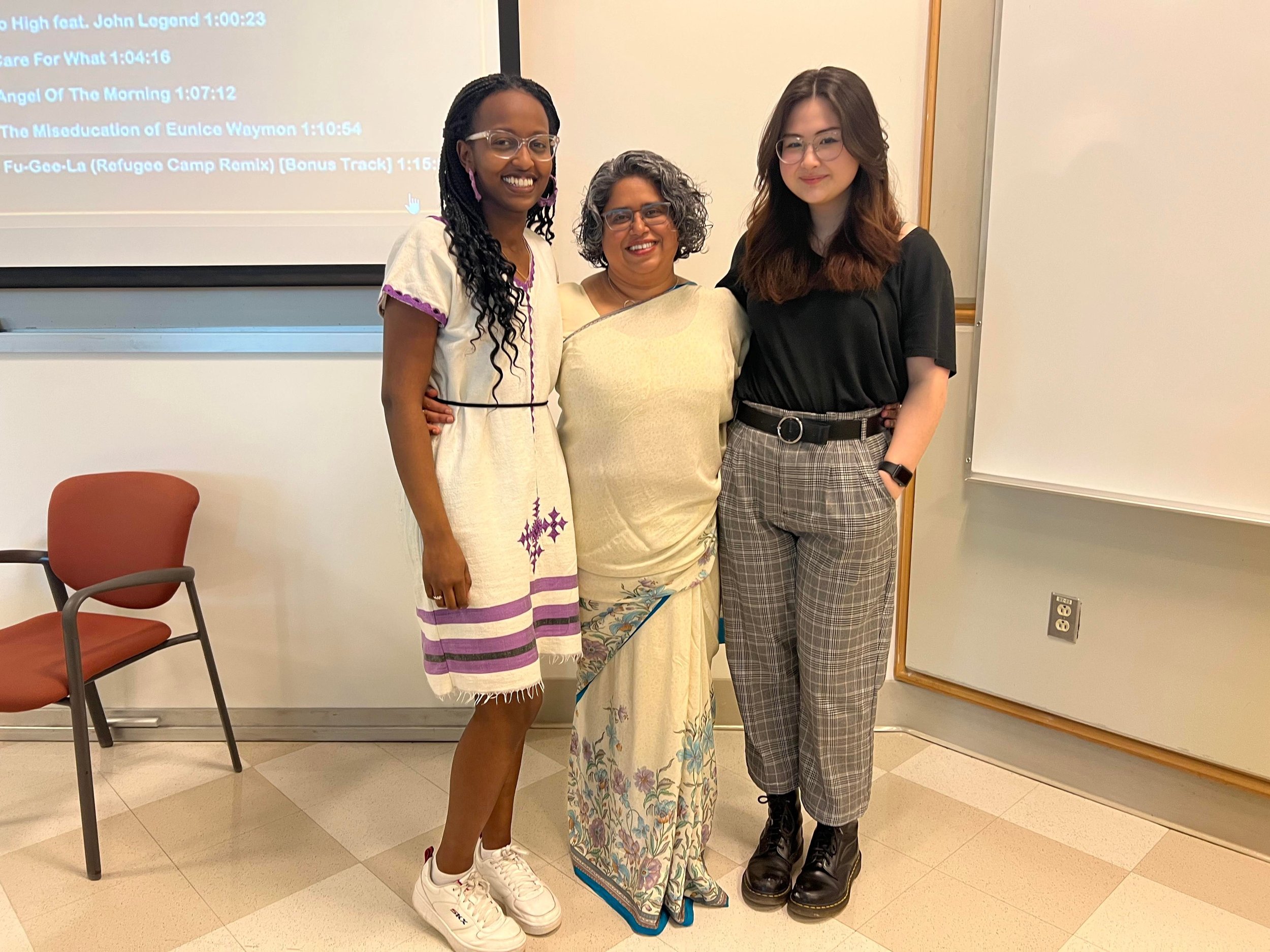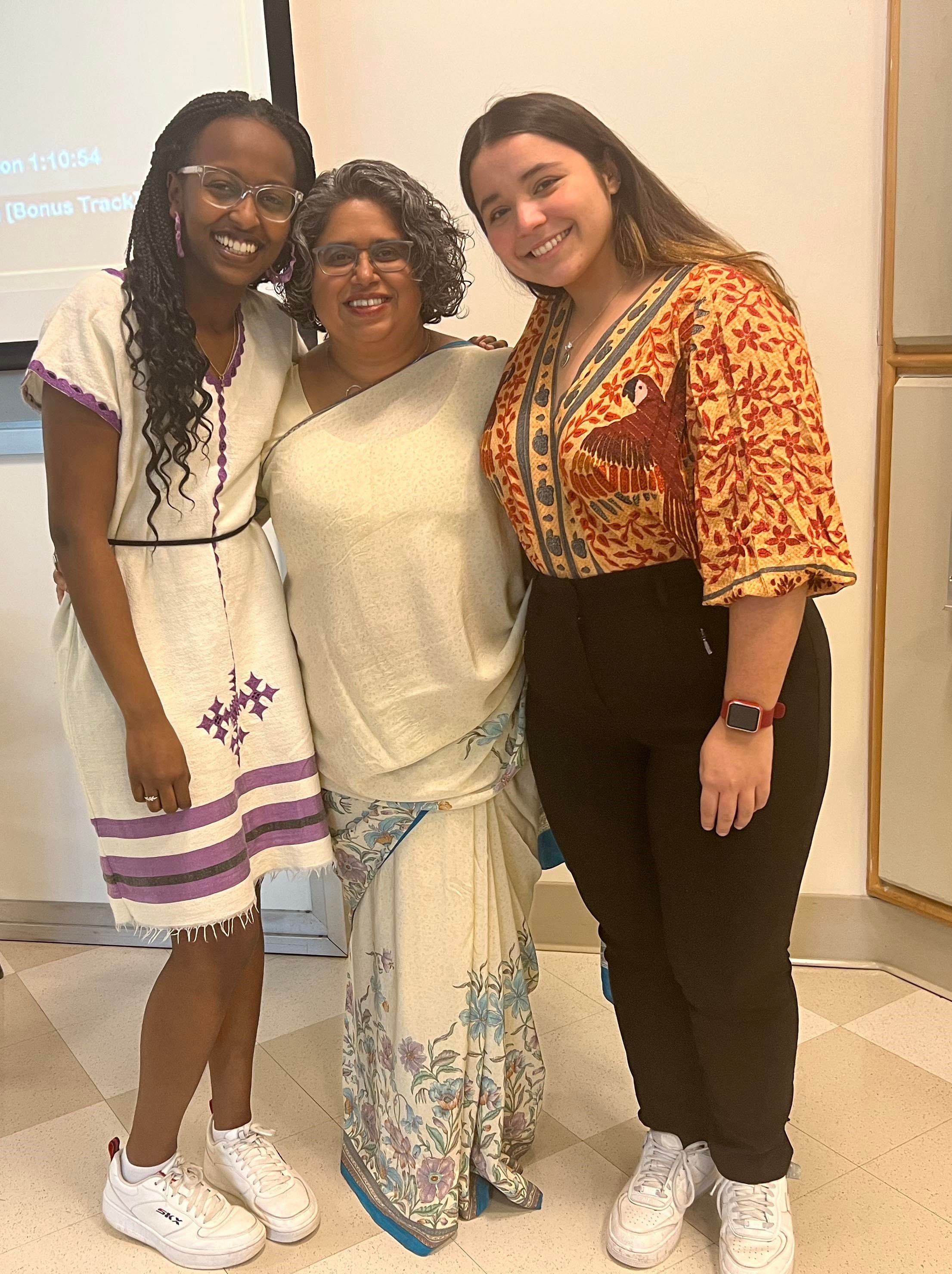Dr. Benita Bunjun
Dr. Benita Bunjun’s innovative teaching methods resonate deeply with her students and colleagues at Saint Mary’s University, inside the classroom and out in the community.
Her teaching philosophy, in a nutshell: “I am invested in envisioning programs, curricula and resources that promote alternative and diverse perspectives and knowledge systems which have predominantly been omitted, silenced and excluded from academic spaces of learning.”
Dr. Bunjun’s important efforts were honoured May 20 during Spring Convocation week, as she received two of the university’s top awards for faculty members:
“It means a lot to me to be recognized for the way that I teach, and also the ways that I’m trying to shift the culture of teaching. Delivering information and knowledge while also transforming spaces of learning with a kind of care built within pedagogy. That’s really important for me,” says Bunjun, whose teaching practice is rooted in intersectionality, interdisciplinarity and social justice.
“During my time as Dr. Bunjun’s student, she acted as not only a professor, but as a true mentor. It is largely due to her encouragement, support and engagement that I was able to finish my degree with honours and continue with my education. I have continuously witnessed Dr. Bunjun show similar care and engagement with other students, all while remaining respectful of individual differences and learning styles.””
She is an associate professor in the Department of Social Justice and Community Studies (SJCS), and in the Women and Gender Studies program. Since joining Saint Mary’s in 2016, she has prioritized collaborative teaching and curriculum development with community educators and SMU colleagues, particularly in the realm of anti-colonial feminist knowledges.
Recent examples of this are two new courses offered this past year: Indigenous Settler Relations, which she co-taught and developed with Michelle Paul, a Mi’kmaw Water Protector and educator; and Indigenous Relations and Knowledges, also coordinated with Paul and co-taught with Prof. Raymond Sewell and Indigenous community educators Diane Obed, Aaron Prosper and Toni Goree. Her Community Organizing course is another pivotal undergraduate experience. Students learn to work together on advocacy for causes they care about, in real-world settings with community relationships Bunjun has built over time.
Beverlee MacLellan BA’20 was one of the first students to graduate with the Social Justice and Community Studies major. In nominating Bunjun for the Father Stewart Award, MacLellan recalled being profoundly inspired from the very first class. Ten others, including former students, teaching assistants, mentees and faculty members, supported the nomination, praising Bunjun for creating an inclusive environment where students build critical thinking skills and self-confidence.
“Her office has become a safe space for anyone who finds themselves marginalized for race, nationality, sexuality, gender, class and/or disability, where she offers attentive listening and an abundance of snacks,” said MacLellan. “Her self-awareness makes her humble enough to listen to and accept experiences beyond her own, which is an important trait in the humanities, as it can improve perspective and scholarship.”
Soon after arriving at Saint Mary’s, Bunjun created the Racialized Students Academic Network (RSAN), a crucial point of ongoing connection for both students and alumni. She and RSAN organize the annual Critical Indigenous, Race and Feminist Studies Student Conference (CIRFS). Now in its fifth year, the event has culminated in the book Academic Well-Being of Racialized Students (Fernwood Publishing, 2021), edited by Bunjun and featuring essays and poems by students, faculty and alumni. Plans are in the works for a second edition.
“Everything I’m trying to be and do at Saint Mary’s is a building block,” Bunjun says. “This is the only conference like this in the Maritimes. The amount of labour to support that journey for students is tremendous, but not only is it an engagement with professional development but also of building strong transnational kinship relations amongst the students.”
“Her office has become a safe space for anyone who finds themselves marginalized for race, nationality, sexuality, gender, class and/or disability, where she offers attentive listening and an abundance of snacks. Her self-awareness makes her humble enough to listen to and accept experiences beyond her own, which is an important trait in the humanities, as it can improve perspective and scholarship.”
For many students who attend CIRFS, it’s their first time presenting academic research, so Bunjun offers advance workshops on how to write an abstract, and how to present at a conference. This year, she supported the Tenancy Rights of International Students (TRIS) Project coordinators to present at the conference. Bunjun also coordinates TRIS with SJCS students Lena MacKay and Nadian Looby, by working with international students at a number of local universities to promote their scholarship, rights, well-being and self-advocacy.
“During my time as Dr. Bunjun’s student, she acted as not only a professor, but as a true mentor,” Tia DeGiobbi BA’17 said in supporting the teaching award nomination. “It is largely due to her encouragement, support and engagement that I was able to finish my degree with honours and continue with my education. I have continuously witnessed Dr. Bunjun show similar care and engagement with other students, all while remaining respectful of individual differences and learning styles.”
In 2020, Bunjun also received the Saint Mary’s University Student Association Award for Overall Excellence in the Field of Education.
For her Dr. Geraldine Thomas Educational Leadership Award, her nominators included RSAN and faculty members from four different academic departments. They recognized her tireless work as a mentor to students, teaching assistants and fellow faculty members, and for educating colleagues throughout the university in relation to her critical thinking on Equity, Diversity, Inclusion, and Accessibility (EDIA) by advocating for the decentralization and implementation of EDIA in all aspects of the university.
As an innovative educator, Bunjun co-created the SJCS department and much of its curriculum. Her leadership “has been crucial to building our impressive student major and minor numbers only a few years into our department’s existence,” noted her colleague Dr. Val Marie Johnson.
Bunjun’s own research examines organizational and institutional power relations, with a focus on colonial encounters within academic spaces. She starts a sabbatical leave in September, and has a typically busy summer lined up working with students on directed study projects.
In expressing gratitude for the awards, Bunjun thanks her nominators, her own mentors, and her colleagues “who stand by my vision as a teacher, and who have demonstrated so much solidarity and care as faculty on our campus.” As a faculty member who has worked in five post-secondary institutions, she continues “to urge universities to be brave and make informed, relevant decisions to promote well-being in our institutions.”
Learn more about the Social Justice and Community Studies program.



